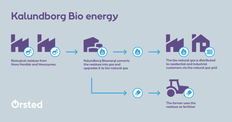- The plant processes 300,000 tonnes of biomass annually.
- Construction began in spring 2017.
- The plant produces 8 million cubic meters of bio-natural gas per year.
- The project involves Ørsted, Bigadan, Novo Nordisk, and Novozymes.

Project Overview
Ørsted and Bigadan have inaugurated Eastern Denmark's largest biogas plant, which will convert residues from Novo Nordisk and Novozymes into bio-natural gas and fertilizer. The plant is located in Kalundborg and was officially opened by the Danish Minister for Energy, Utilities and Climate.
Biogas Production
The plant will process approximately 300,000 tonnes of biomass annually from Novo Nordisk and Novozymes. This biomass will be converted into biogas, which is then upgraded to bio-natural gas. The bio-natural gas can replace fossil natural gas, offering significant carbon savings.
Circular Economy
After processing, the residues will be used as fertilizer, ensuring that all nutrients are recovered. This initiative supports a true circular economy by doubling the recycling of residues and optimizing production processes.
Kalundborg Symbiosis
The biogas plant is part of the Kalundborg Symbiosis, a unique partnership that has connected industries and public-private players for over 45 years. The symbiosis now includes 25 different flows, with the new biogas plant being a key example of sustainable and circular production.
Operational Details
Construction of the plant began in spring 2017, and it is now ready for commercial operation. Bigadan, with over 30 years of experience in the biogas industry, will operate the plant and manage the sale of bio-fertilizer to farmers on Zealand. The plant is capable of producing 8 million cubic meters of bio-natural gas annually, equivalent to the natural gas consumption of approximately 5,000 households, and will save around 17,000 tonnes of carbon per year.

